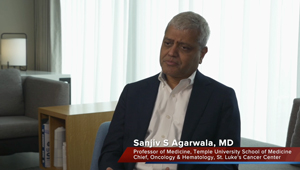ASCO Highlights
Dr Sanjiv Agarwala argues that much of the biomarker data in melanoma presented at ASCO 2018 are around the value of PD-L1 testing; however, even PD-L1–negative melanoma patients seem to respond to anti–PD-1 therapy, although some studies suggest PD-L1–negative patients may be better candidates for combination immunotherapy. Read More ›
Dr Sanjiv Agarwala reviews real-world data presented at ASCO 2018 on immunotherapy of melanoma that serve to reassure providers regarding current treatment approaches, but do not offer any significant practice-changing results. Read More ›
Dr David Spigel discusses challenges and solutions to incorporating cancer biomarkers into patient care, including finding pathology resources to do the testing, issues around reimbursement, and educating colleagues on the value and operational aspects of biomarker testing in delivering personalized therapy to patients with cancer. Read More ›
Dr Sanjiv Agarwala talks about exciting new results presented at ASCO 2018 in melanoma, including the durability of anti–PD-1 therapy in providing 40% overall survival at 5 years, updates on adjuvant therapy showing superiority of anti–PD-1 over anti–CTLA-4, and new results in combining immunotherapies. Read More ›
Dr David Spigel talks about currently available and emerging biomarkers that predict the greatest sensitivity to immunotherapy, including his insight into PD-L1, MSI, and TMB. Read More ›
Dr David Spigel discusses how medical oncologists and the rest of the cancer care team can best communicate with pathologists to help make informed treatment decisions for individual patients and set up new assays for emerging biomarkers as they are discovered. Read More ›
Dr David Spigel reviews 3 of the most important, practice-changing topics at ASCO 2018: new therapies targeting RET in a number of tumor types, a prognostic biomarker assay to predict whether patients with breast cancer will need adjuvant hormonal therapy or chemotherapy, and the minimum level of PD-L1 positivity required to predict outcomes with immunotherapy in lung cancer. Read More ›
Dr David Spigel considers how patient-reported outcomes, as well as palliative and supportive care, are revolutionizing cancer care so that consideration is being given to treating the patient, not just the cancer. Read More ›
Dr David Spigel discusses the 2 major themes highlighted at ASCO 2018: the use of cancer biomarkers to achieve precision therapy, and fine tuning treatment of patients with immunotherapy with respect to who to treat, how to treat, and how to predict clinical outcomes. Read More ›










